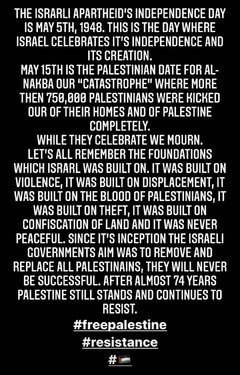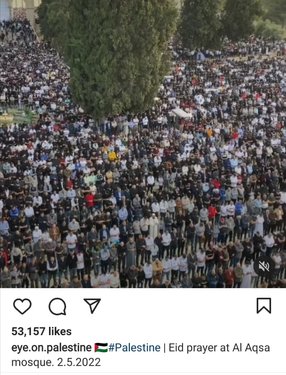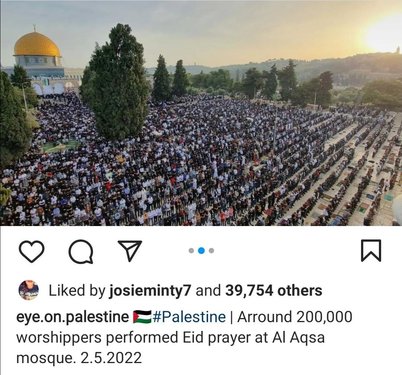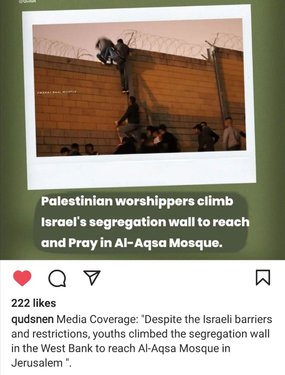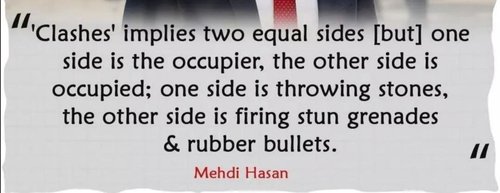-
Posts
8,434 -
Joined
-
Days Won
771
Content Type
Profiles
Forums
Events
Everything posted by ummtaalib
-

Information on the Islamic Months
ummtaalib replied to ummtaalib's topic in General Islamic Articles
7 - Rajab True Appreciation of Rajab Month of Rajab- Do's & Don'ts Rajab Authenticity of the Rajab Du'a -

Information on the Islamic Months
ummtaalib replied to ummtaalib's topic in General Islamic Articles
6 - Jumada Thani -

Information on the Islamic Months
ummtaalib replied to ummtaalib's topic in General Islamic Articles
5 - Jumada Awwal -

Information on the Islamic Months
ummtaalib replied to ummtaalib's topic in General Islamic Articles
4 - Rabi’ Thani -
The Sunnah of meeting the Haji
-
Are both Qurbani and Damm-Shukr necessary in Hajj
-
When are we exempt from fasting?
-
Not Fasting Due To Illness - Qadha or Compensation
-
Israeli court paves way for eviction of 1,000 Palestinians from West Bank area Land to be repurposed for military use in one of the biggest expulsion decisions since 1967 occupation After a two-decade legal battle, Israel’s high court has ruled that about 1,000 Palestinians can be evicted from an area of the West Bank and the land repurposed for Israeli military use, in one of the single biggest expulsion decisions since the Israeli occupation of the Palestinian territories began in 1967. About 3,000 hectares of Masafer Yatta, a rural area of the south Hebron hills under full Israeli control and home to several small Palestinian villages, was designated as a “firing zone” by the Israeli state in the 1980s, to be used for military exercises, in which the presence of civilians is prohibited. According to the Geneva conventions pertaining to humanitarian treatment in war, it is illegal to expropriate occupied land for purposes that do not benefit the people living there, or to forcibly transfer the local population. Israel has argued, however, that the Masafer Yatta villagers living in Firing Zone 918, farming and raising animals there, were not permanent residents of the area when the firing zone was declared, and therefore have no rights to the land. The high court decision published overnight on Wednesday – ahead of Israel’s Independence Day on Thursday, a public holiday – accepted the state’s argument that the community could not prove they were residents before the 1980s, despite expert testimony and literature presented in court that showed the area has been inhabited for decades. The judges also rejected the claim that the “prohibition of forcible transfer set forth in international law is customary and binding”, calling it instead a “treaty norm” that is not enforceable in a domestic court, according to the Israeli international human rights lawyer Michael Sfard. The Israeli defence ministry, one of the bodies responsible for Israeli policy in the occupied West Bank, did not immediately respond to a request for comment. Since the judges’ decision was unanimous it is not clear whether any further Israeli legal channels are available for the residents of the eight Masafer Yatta villages to appeal. While the ruling did not order evictions, should it choose to do so Israel could now move to forcibly expel the Palestinians at any time. “The court decision is a racist decision taken by a settler judge [David Mintz, who lives in an illegal settlement in the West Bank],” said Nidal Younes, the head of the Masafar Yatta village council. “We have been fighting with Israel in the courts for the last 22 years and it took this judge five minutes to destroy the lives of 12 villages and the people who are dependent on the land. “In the end, history repeats itself: Nakba after Nakba,” he said, using the Arabic term for the expulsion of Palestinians from Israel in wars surrounding the state’s creation in 1948. Eighteen per cent of the occupied West Bank has been declared “firing zones” for Israeli military training since the 1970s. According to the minutes of a 1981 ministerial meeting, the then agriculture minister, Ariel Sharon, later prime minister, proposed creating Firing Zone 918 with the explicit intention of forcing local Palestinians from their homes. Palestinian communities living within firing zones have been repeatedly threatened with home demolitions and the confiscation of agricultural land because they lack building permits, which are issued by the Israeli authorities and are nearly impossible to obtain. Residents of Masafer Yatta have also been subjected to intensifying attacks from nearby illegal Israeli settler communities in recent years. In 1999, 700 residents of Firing Zone 918 were evicted, but after an appeal by the Association for Civil Rights in Israel (ACRI) the supreme court issued an injunction allowing the residents to return until a final decision was made by the high court. The injunction had remained the uneasy status quo until Wednesday’s ruling. Compromises put forward by the Israeli state that would have allowed Palestinian villagers to work inside the firing zone on weekends, Israeli holidays and for two non-consecutive months of the year were rejected by the Masafer Yatta community on the grounds that it would not be possible to sustain farming activities or make a living. Breaking the Silence, an Israeli NGO, said in a statement: “The high court has just green-lighted the largest population transfer in the history of the occupation since the early 1970s. “Deportation of over 1,000 people in favour of expanding settlements, outposts and training of Israel Defence Forces soldiers is not only a humanitarian catastrophe that could set a precedent for other communities across the West Bank, but also a clear step in de facto annexation of the occupied Palestinian territories and cementing military rule indefinitely.” theguardian.com
-
Forced eviction of Masafer Yatta Israeli apartheid court issued the final decision of Masafer Yatta case. Eight Palestinian villages will be completely evicted, ethnically cleansed at any moment. This is a brutal crime of forcible transfer—1200 people will be removed from their land. Stand with Masafer Yatta.Stop Israel’s policy of ethnic cleansing.Stop the crime of forcible transfer.Defund racist settler organizations. #DefundRacism #save_masafer_yatta Sami H Huraini (@samihuraini) • Instagram photos and videos
-
The Israeli occupation forces raid Al Qibli prayer hall after breaking its doors. 5.5.2022 Israeli soldiers assault worshippers in the courtyards of Al-Aqsa Mosque. 5.5.5.2022 The Israeli occupation forces prevent worshippers from entering Al Aqsa mosque through Lion's gate. 5.5.2022 The Israeli occupation forces detain arround 50 Palestinian youth in Al Aqsa mosque. 5.5.2022 Around 600 Israeli settlers broke into Al Aqsa mosque under the protection of occupation forces, this morning. 5.5.2022 www.instagram.com/eye.on.palestine/
-
Isra-eilis celebrate "Independence day" @friendsofalaqsa 🔴 Israeli Occupation Forces have violently assaulted Palestinian worshippers at Al-Aqsa AGAIN this morning to make way for settlers to mark Israel's “Independence Day” (74 years of occupation and apartheid against Palestinians) 🔴 In this latest desecration of the sacred site, Israeli bullets smashed the glass of Al-Aqsa’s pulpit 🔴 This is to allow more incursions by illegal Israeli settlers. This poses a dangerous threat to the status quo of Al-Aqsa 🔴 If this repeated violence was seen at any other place of worship, our politicians would have taken action by now. They must TAKE ACTION for Al-Aqsa
-
-
The Israeli occupation forces withdraw from Al Aqsa mosque after raiding it after Fajir (Dawn) prayer, today. 29.4.2022 www.instagram.com/p/Cc7BJouFwQx/
-
Worshippers at Al-Aqsa under attack again today 29.4.2022 The Israeli occupation forces besiege worshippers inside Al Qibli prayer hall and break its windows to fire tear gas and rubber coated steel bullets at them. www.instagram.com/p/Cc64nTeIkeU/ The Israeli occupation forces block the gates of Al Qibli Prayer Hall which chains while besieging dozens of worshippers inside it. 29.4.2022 www.instagram.com/p/Cc6-029F-QD/ The Israeli occupation forces shoot rubber coated steel bullets at worshippers after raiding Al Aqsa mosque. 29.4.2022 www.instagram.com/p/Cc66Q_bod0l/
-
-
Arround 250,000 worshippers mark Laylat al Qadr at Al Aqsa mosque Video here showing Al-Aqsa packed with worshippers www.instagram.com/p/Cc3wUnClGfx/ Palestinian youth climb the Israeli apartheid wall to reach Al Aqsa mosque in the occupied city of Jerusalem. www.instagram.com/p/Cc3twACNt3F/
-
-
Question: If you see menstrual blood after Maghrib, and aren’t sure when it started, is your fast valid? Answer: Bismi Llahir Rahmanir Rahim Assalamu alaykum wa rahmatuLlahi wa barakatuhu If menstruation occurs at any time during the fasting day – namely from the entrance of Fajr to the entrance of Maghrib – the fast is not valid. This is the ruling even if menstruation starts one minute before Maghrib enters. As for the question at hand, there are two possible scenarios. First Scenario – Unsure When Blood Exited If you honestly do not know when the bloody discharge exited, then the principle is that menstruation starts when you actually see the blood. For example, Aisha is fasting during Ramadan. Maghrib enters at 6 pm. She goes to the bathroom at 6:15 pm and sees blood on her pantyliner. She does not know when the bleeding exited. In this case, she assumes that the blood exited when she saw it at 6:15 pm. Therefore, her fast is valid because her menstruation started after Maghrib. Second Scenario – Reasonably Sure When It Exited However, if she feels the wetness exit her vagina before she uses the bathroom, and she is reasonably certain that it is menstrual blood, then she should consider that her menses started when she felt the wetness. For example, Hina is fasting during Ramadan. Maghrib enters at 6 pm. She is expecting her period to start soon. At 5:50 pm, she feels discharge exit her vagina. She does not make it to the bathroom until 6:15 pm. She sees blood on her pantyliner, and knowing her body, she is reasonably sure that the bleeding exited when she felt it at 5:50 pm. Thus, her menstruation started at 5:50 PM and her fast is invalid. She must make it up after Ramadan finishes in a time when she is not menstruating. For more details about the rulings of menstruation related to Ramadan, please refer to this article: Menstruation Rulings Related To Ramadan. Jazak Allah khayran Naielah Ackbarali
-
Taraweeh - Case Closed! Reply to Dr. Zakir Naik
-
"Successful indeed is the one who purifies their soul, and doomed is the one who corrupts it!” (91:9-10). Why do you fast? Is it because everyone around you does? Is it because it’s one of the five pillars? Have you ever wondered why it is one of the five pillars? Although we strive to learn about the legal rulings of fasting, we often miss out on reflecting upon and attaining the spiritual elements of fasting. An insightful new PDF that explains how fasting is connected to the actions of the heart and how fasting purifies the soul and helps us attain taqwā, ikhlāṣ, ṣabr and shukr. This FREE PDF includes: Fasting & The Purification of The Soul Taqwā: The Purpose of Fasting Fasting & Ṣabr: A Training Programme to Stop Sinning Fasting & Shukr: The Blessing of Ifṭhār and Suḥūr Fasting & Ikhlāṣ Download, read, print and share with family and friends HERE May Allah al-Quddūs (The Pure) make our hunger and thirst a means of purifying our hearts this Ramadhan.
-
وَقَالَ رَبُّكُمُ ٱدْعُونِىٓ أَسْتَجِبْ لَكُمْ “And your Lord said: ‘Call upon Me; I will respond to you.’” (40:60) Duʿā’ is the essence of worship. It is every moment, minute and hour in which we pour our hearts out to Allah, praise Him, seek His forgiveness and beg Him. Through duʿā’, we express our humility, dire state of poverty and utmost need of our Lord. Through duʿā’, we affirm our complete submission to Allah and express our ʿubudiyyah (servitude) to Him. Duʿā’ is a whispering conversation with Allah, our Creator, Lord and Sustainer. We ask Him because only He can give. He has power over everything, whilst we have none. His knowledge encompasses everything, whilst we know little. He is the Lord and we are His slaves. The Messenger of Allah ﷺ said, “There is nothing more honourable to Allah than duʿā’.” Whilst our fellow humans tire of our persistent questioning and begging, Allah, our Generous Lord, does not stop giving and is angered when we don’t ask from Him! Our beloved Prophet ﷺ said, “Allah is angry with those who do not make duʿā’ to Him” (Tirmidhī). ‘I Am Near’ ‘Interposed among the verses dealing with fasting comes a verse reflecting a profound insight into human nature. It reaches to the deepest recesses of the human psyche, offering solace and ample rewards for keeping the fast in response to God’s commands: “If My servants ask you about Me, well, I am near; I answer the prayer of the supplicant when he calls to Me. Let them then respond to Me, and believe in Me, so that they may follow the right way.” (2:186) How kind and compassionate God truly is! Any hardship encountered in keeping the fast fades in comparison with this friendly and gentle reassurance. The choice of words creates an atmosphere of intimacy and accessibility, with God Himself stating a direct contact between Him and His servants. He does not give instructions to His Messenger, the Prophet Muḥammad on how to answer believers’ questions about Him. He gives the answer Himself: “I am near.” His closeness is not only to listen but also for immediate response: “I answer the prayer of the supplicant when he calls to Me.” This verse fills a believer’s heart with love, confidence and utter reassurance. In this atmosphere of friendliness and compassion, God, who has no need for anyone, directs believers to respond to Him and believe in Him, in the hope that this will guide them to wisdom and righteousness. “Let them then respond to Me, and believe in Me, so that they may follow the right way.” By earning God’s generosity and guidance, believers end up winners on all counts.’ (Fī Ẓilāl al-Qur’ān) The Secret of Duʿā’ The secret to making duʿāʿ is to display one’s utter need of Allah, with utmost humility, desperation and dependence. We see a beautiful illustration of this in the life of Prophet Musa (ʿalayhis-salām), whilst he is fleeing one of history’s greatest tyrants. He is forced into exile to Madyan where he is left penniless, scared, hungry and alone; a foreigner in a strange land. Instead of wallowing in self-pity, we see his chivalry as he helps two young women to water their animals. He then withdraws into the shade and turns to the One Free of all need and begs: “My Lord, I am in dire need of whatever good thing You may send me” (28:24). Breaking down in utter desperation and begging Allah (ʿazza wa jall) is how we should make duʿā’ on a daily basis, as though our lives depended on it and we could not survive without it. We are weak and in need of Allah (ʿazza wa jall) for everything. We cannot do without Him for the blink of an eye. If we beg Him whole-heartedly and sincerely, we will witness the gifts from Allah al-Wahhāb (The Ever Giving) shower into our lives. In the Steps of the Prophets The secret of worship lies in the duʿās of the Prophets. Each duʿā’ is an embodiment of their courtesy (adab), shyness and humility. Each duʿā’ is a testimony to their awareness of and deep intimacy with their Lord. Rather than rushing to make their requests, they praised Allah, glorified Him, and asked through His Most Perfect Names. It is this aspect of duʿā’ which we often skip out and neglect. Praising Allah and intimately conversing with Him (munājāt) is a powerful way to taste the sweetness of worship, especially in qiyām whilst prostrating. How Can We Praise Allah? 1. We praise Him as He has praised Himself. This is the best way to praise Allah. This can be learnt by reciting the Qur’an, reflecting upon it and forming a strong bond with it, since it is replete with the Allah praising Himself. 2. Praise Him as our beloved Messenger ﷺ praised Him. Of Allah’s creation, none surpassed him in knowing Him and appreciating Him as He ought to be. 3. Praise Him with words used by the companions (radiy Allāhū ʿanhum) and the pious predecessors. 4. Praise Him with one’s own words emanating from the heart, so long as it does not contradict sound beliefs. 5. One of the best ways of praising Allah is through His Beautiful Names. Key Times To Make Duʿā’ in Ramaḍān Ramaḍān is duʿā’ prime-time. The beauty of duʿā’ is that it can be done at any time and in any language. In Ramaḍān however, there a few special moments which we should carve out in our daily schedules to make duʿā’. a) Throughout the fast. Our beloved Messenger ﷺ said, “There are three whose duʿā’ is not rejected: the fasting person until he opens his fast, the just leader, and the supplication of the oppressed person…” (Tirmidhī). Imām al-Munāwī (raḥimahullāh) said that this refers to the person who fasts comprehensively, and protects his body parts from disobeying Allah. Thus, his duʿā’ is accepted due to the purity of his body, resulting from the person disobeying his own whims and desires. Another possible reason for why the duʿā’ of the fasting person is accepted is because he is in a state of weakness. When he feels hunger, he is more likely to humble himself, and feel his need for Allah. Similarly, spending the day and night in worship, in a season where Allah’s mercy descends and wherein one sins less, makes it more likely for one’s duʿā’ to be accepted. b) At the time of ifṭār. Our beloved Messenger ﷺ said, “Indeed, the fasting person has a supplication at the time of his iftār which is not rejected” (Ibn Mājah). c) In the last third of the night, in sujūd. The Prophet ﷺ said, “Our Lord – Glorified and Exalted is He – descends every night to the lowest heaven when one-third of the night remains and says: ‘Who will call upon Me, that I may answer Him? Who will ask of Me, that I may give him? Who will seek My forgiveness, that I may forgive him?’” (Bukhārī) He ﷺ also said, “As for sujūd, go to great lengths in making duʿā’ in it, as it is likely that your duʿā’ shall be answered” (Muslim). The Optimal Guide For Making Duʿā’ 1. Make your heart present and completely focus on Allah. 2. Choose a time in which duʿā’ is readily accepted. 3. Perform wuḍū, face the qiblah and raise your hands. 4. Humble yourself and submit to Allah. 5. Start by praising Allah. 6. Send ṣalawāt upon the Prophet ﷺ. 7. Repent for your sins and ask for forgiveness. 8. Ask with persistence, love and fear. 9. Ask Allah through His Oneness and Names. 10. Give ṣadaqah before making duʿā’. (Adapted from Ibn al-Qayyim’s al-Jawāb al-Kāfī) For a detailed guide to making duʿā’, please refer to ‘I Am Near’ by Life With Allah or the Dhikr & Dua App. Source

